Argumentative Essay on Grading System - British Columbia Schools
VerifiedAdded on 2023/06/04
|6
|1711
|234
Essay
AI Summary
This essay presents an argument against the traditional grading system, particularly within the context of British Columbia schools, asserting that it diminishes students' enthusiasm for learning and focuses excessively on achieving high grades rather than fostering a genuine understanding of the subject matter. The author references studies and arguments from educational experts like Boatright-Horowitz, Pulfrey, and Kohn to support the claim that grades negatively impact students' intrinsic motivation and critical thinking abilities. The essay highlights how a grade-oriented environment can lead students to prioritize rote memorization and test-passing strategies over in-depth learning and exploration of concepts. It advocates for alternative assessment methods that emphasize comprehension and conceptual understanding, ultimately arguing that true knowledge and the ability to apply it are more valuable than high grades in preparing students for real-world challenges. The essay concludes that the current grading system is not an effective evaluation method and calls for a shift towards a more holistic and learning-centered approach to education.
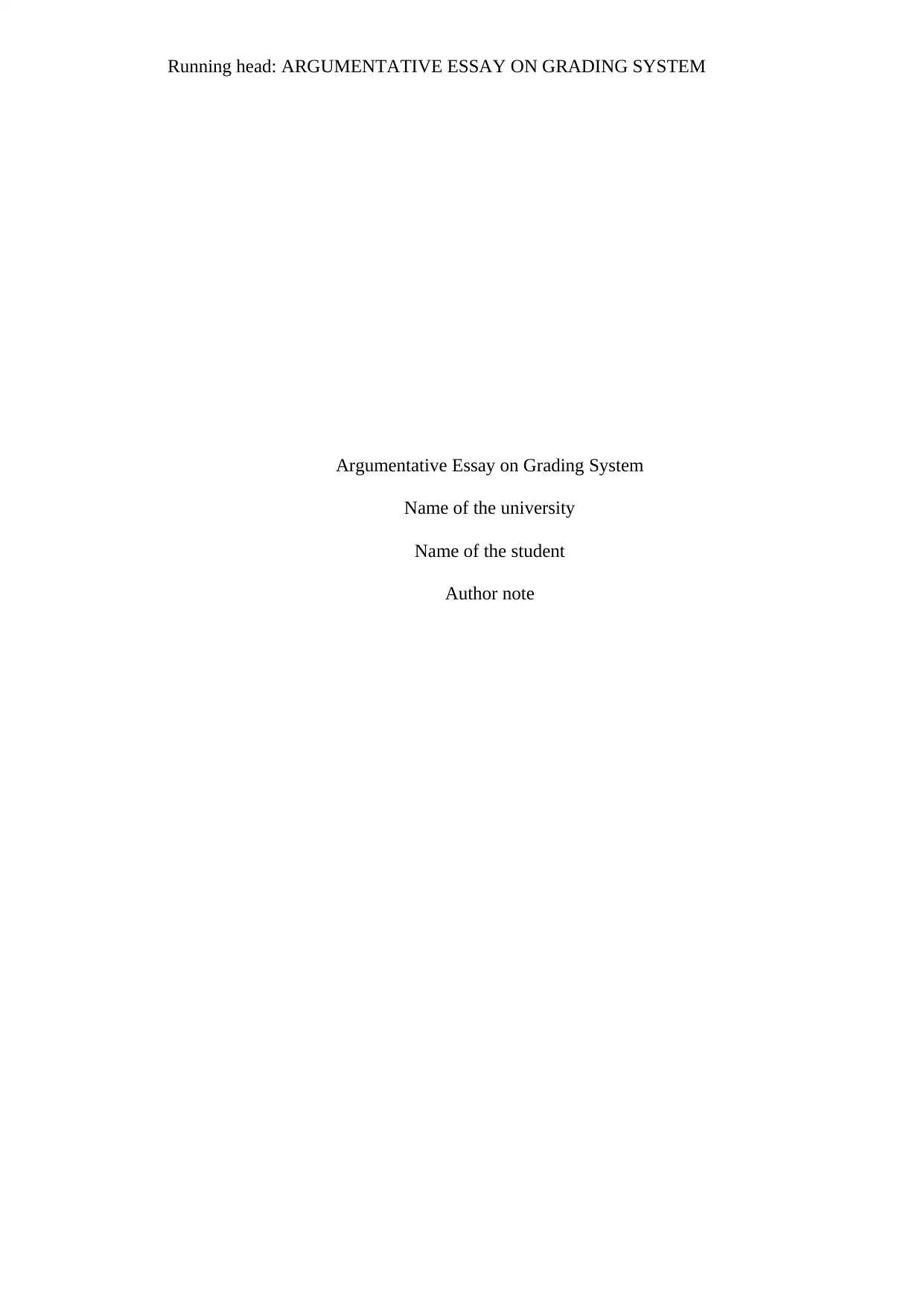
Running head: ARGUMENTATIVE ESSAY ON GRADING SYSTEM
Argumentative Essay on Grading System
Name of the university
Name of the student
Author note
Argumentative Essay on Grading System
Name of the university
Name of the student
Author note
Paraphrase This Document
Need a fresh take? Get an instant paraphrase of this document with our AI Paraphraser
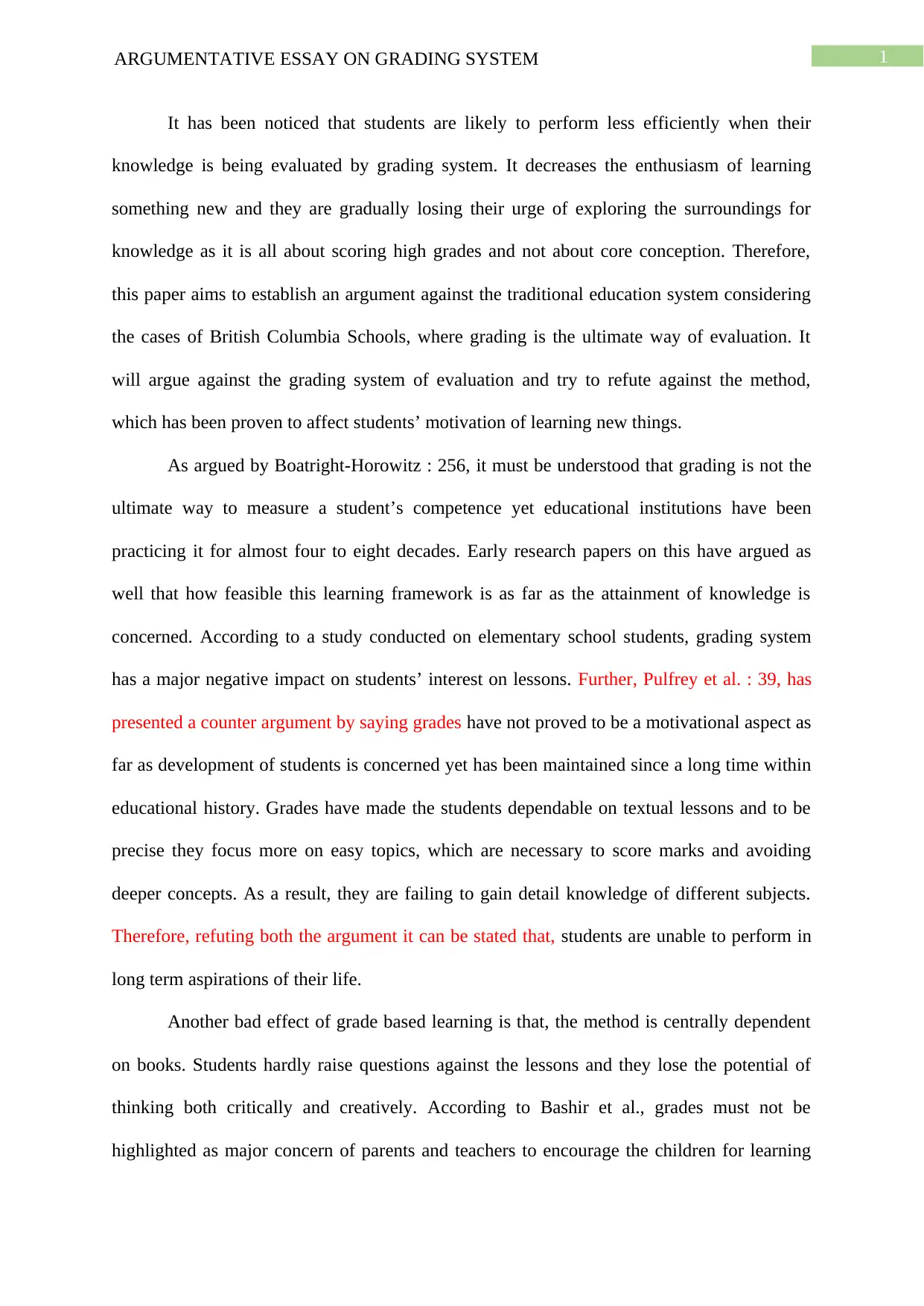
1ARGUMENTATIVE ESSAY ON GRADING SYSTEM
It has been noticed that students are likely to perform less efficiently when their
knowledge is being evaluated by grading system. It decreases the enthusiasm of learning
something new and they are gradually losing their urge of exploring the surroundings for
knowledge as it is all about scoring high grades and not about core conception. Therefore,
this paper aims to establish an argument against the traditional education system considering
the cases of British Columbia Schools, where grading is the ultimate way of evaluation. It
will argue against the grading system of evaluation and try to refute against the method,
which has been proven to affect students’ motivation of learning new things.
As argued by Boatright-Horowitz : 256, it must be understood that grading is not the
ultimate way to measure a student’s competence yet educational institutions have been
practicing it for almost four to eight decades. Early research papers on this have argued as
well that how feasible this learning framework is as far as the attainment of knowledge is
concerned. According to a study conducted on elementary school students, grading system
has a major negative impact on students’ interest on lessons. Further, Pulfrey et al. : 39, has
presented a counter argument by saying grades have not proved to be a motivational aspect as
far as development of students is concerned yet has been maintained since a long time within
educational history. Grades have made the students dependable on textual lessons and to be
precise they focus more on easy topics, which are necessary to score marks and avoiding
deeper concepts. As a result, they are failing to gain detail knowledge of different subjects.
Therefore, refuting both the argument it can be stated that, students are unable to perform in
long term aspirations of their life.
Another bad effect of grade based learning is that, the method is centrally dependent
on books. Students hardly raise questions against the lessons and they lose the potential of
thinking both critically and creatively. According to Bashir et al., grades must not be
highlighted as major concern of parents and teachers to encourage the children for learning
It has been noticed that students are likely to perform less efficiently when their
knowledge is being evaluated by grading system. It decreases the enthusiasm of learning
something new and they are gradually losing their urge of exploring the surroundings for
knowledge as it is all about scoring high grades and not about core conception. Therefore,
this paper aims to establish an argument against the traditional education system considering
the cases of British Columbia Schools, where grading is the ultimate way of evaluation. It
will argue against the grading system of evaluation and try to refute against the method,
which has been proven to affect students’ motivation of learning new things.
As argued by Boatright-Horowitz : 256, it must be understood that grading is not the
ultimate way to measure a student’s competence yet educational institutions have been
practicing it for almost four to eight decades. Early research papers on this have argued as
well that how feasible this learning framework is as far as the attainment of knowledge is
concerned. According to a study conducted on elementary school students, grading system
has a major negative impact on students’ interest on lessons. Further, Pulfrey et al. : 39, has
presented a counter argument by saying grades have not proved to be a motivational aspect as
far as development of students is concerned yet has been maintained since a long time within
educational history. Grades have made the students dependable on textual lessons and to be
precise they focus more on easy topics, which are necessary to score marks and avoiding
deeper concepts. As a result, they are failing to gain detail knowledge of different subjects.
Therefore, refuting both the argument it can be stated that, students are unable to perform in
long term aspirations of their life.
Another bad effect of grade based learning is that, the method is centrally dependent
on books. Students hardly raise questions against the lessons and they lose the potential of
thinking both critically and creatively. According to Bashir et al., grades must not be
highlighted as major concern of parents and teachers to encourage the children for learning
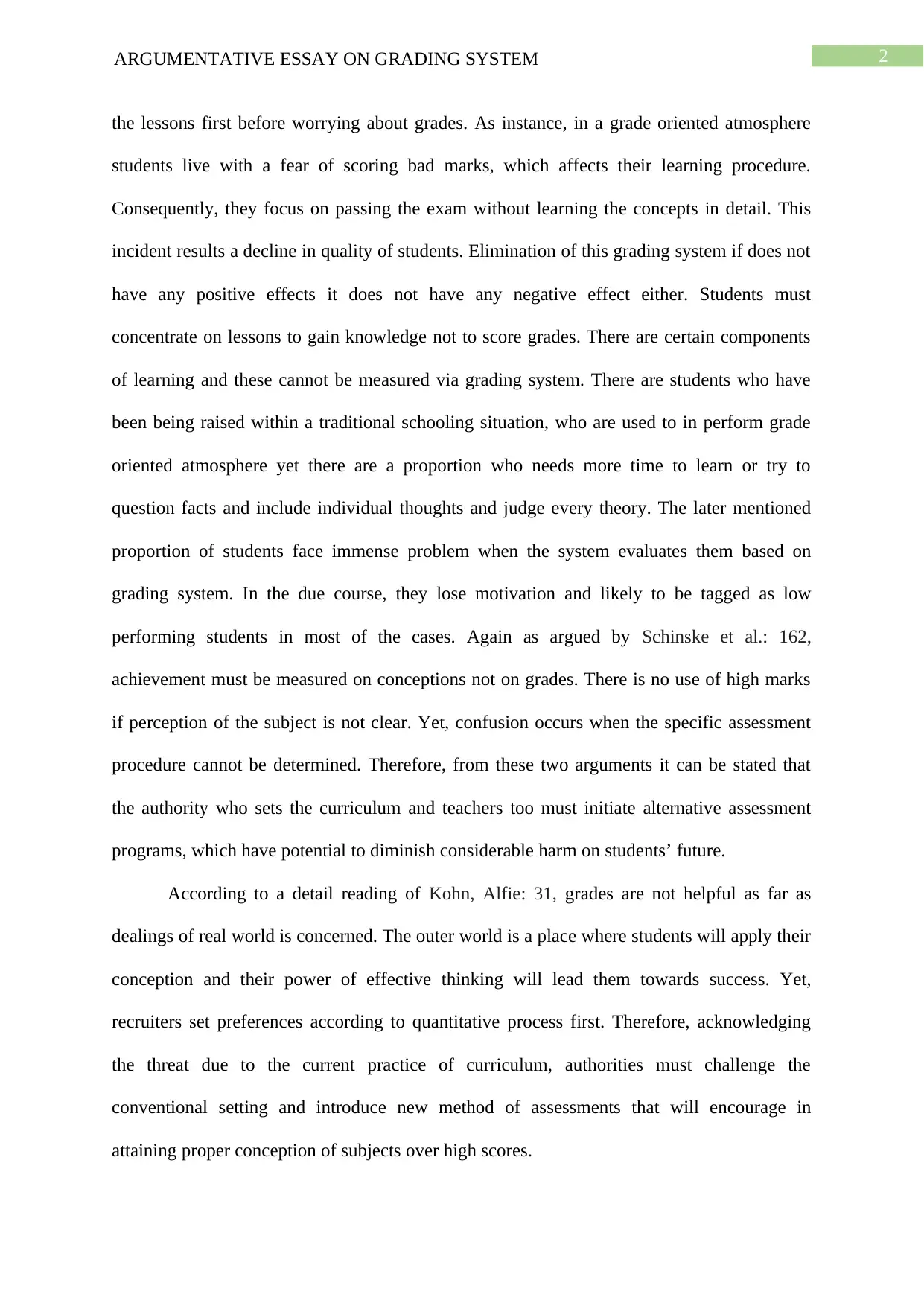
2ARGUMENTATIVE ESSAY ON GRADING SYSTEM
the lessons first before worrying about grades. As instance, in a grade oriented atmosphere
students live with a fear of scoring bad marks, which affects their learning procedure.
Consequently, they focus on passing the exam without learning the concepts in detail. This
incident results a decline in quality of students. Elimination of this grading system if does not
have any positive effects it does not have any negative effect either. Students must
concentrate on lessons to gain knowledge not to score grades. There are certain components
of learning and these cannot be measured via grading system. There are students who have
been being raised within a traditional schooling situation, who are used to in perform grade
oriented atmosphere yet there are a proportion who needs more time to learn or try to
question facts and include individual thoughts and judge every theory. The later mentioned
proportion of students face immense problem when the system evaluates them based on
grading system. In the due course, they lose motivation and likely to be tagged as low
performing students in most of the cases. Again as argued by Schinske et al.: 162,
achievement must be measured on conceptions not on grades. There is no use of high marks
if perception of the subject is not clear. Yet, confusion occurs when the specific assessment
procedure cannot be determined. Therefore, from these two arguments it can be stated that
the authority who sets the curriculum and teachers too must initiate alternative assessment
programs, which have potential to diminish considerable harm on students’ future.
According to a detail reading of Kohn, Alfie: 31, grades are not helpful as far as
dealings of real world is concerned. The outer world is a place where students will apply their
conception and their power of effective thinking will lead them towards success. Yet,
recruiters set preferences according to quantitative process first. Therefore, acknowledging
the threat due to the current practice of curriculum, authorities must challenge the
conventional setting and introduce new method of assessments that will encourage in
attaining proper conception of subjects over high scores.
the lessons first before worrying about grades. As instance, in a grade oriented atmosphere
students live with a fear of scoring bad marks, which affects their learning procedure.
Consequently, they focus on passing the exam without learning the concepts in detail. This
incident results a decline in quality of students. Elimination of this grading system if does not
have any positive effects it does not have any negative effect either. Students must
concentrate on lessons to gain knowledge not to score grades. There are certain components
of learning and these cannot be measured via grading system. There are students who have
been being raised within a traditional schooling situation, who are used to in perform grade
oriented atmosphere yet there are a proportion who needs more time to learn or try to
question facts and include individual thoughts and judge every theory. The later mentioned
proportion of students face immense problem when the system evaluates them based on
grading system. In the due course, they lose motivation and likely to be tagged as low
performing students in most of the cases. Again as argued by Schinske et al.: 162,
achievement must be measured on conceptions not on grades. There is no use of high marks
if perception of the subject is not clear. Yet, confusion occurs when the specific assessment
procedure cannot be determined. Therefore, from these two arguments it can be stated that
the authority who sets the curriculum and teachers too must initiate alternative assessment
programs, which have potential to diminish considerable harm on students’ future.
According to a detail reading of Kohn, Alfie: 31, grades are not helpful as far as
dealings of real world is concerned. The outer world is a place where students will apply their
conception and their power of effective thinking will lead them towards success. Yet,
recruiters set preferences according to quantitative process first. Therefore, acknowledging
the threat due to the current practice of curriculum, authorities must challenge the
conventional setting and introduce new method of assessments that will encourage in
attaining proper conception of subjects over high scores.
⊘ This is a preview!⊘
Do you want full access?
Subscribe today to unlock all pages.

Trusted by 1+ million students worldwide
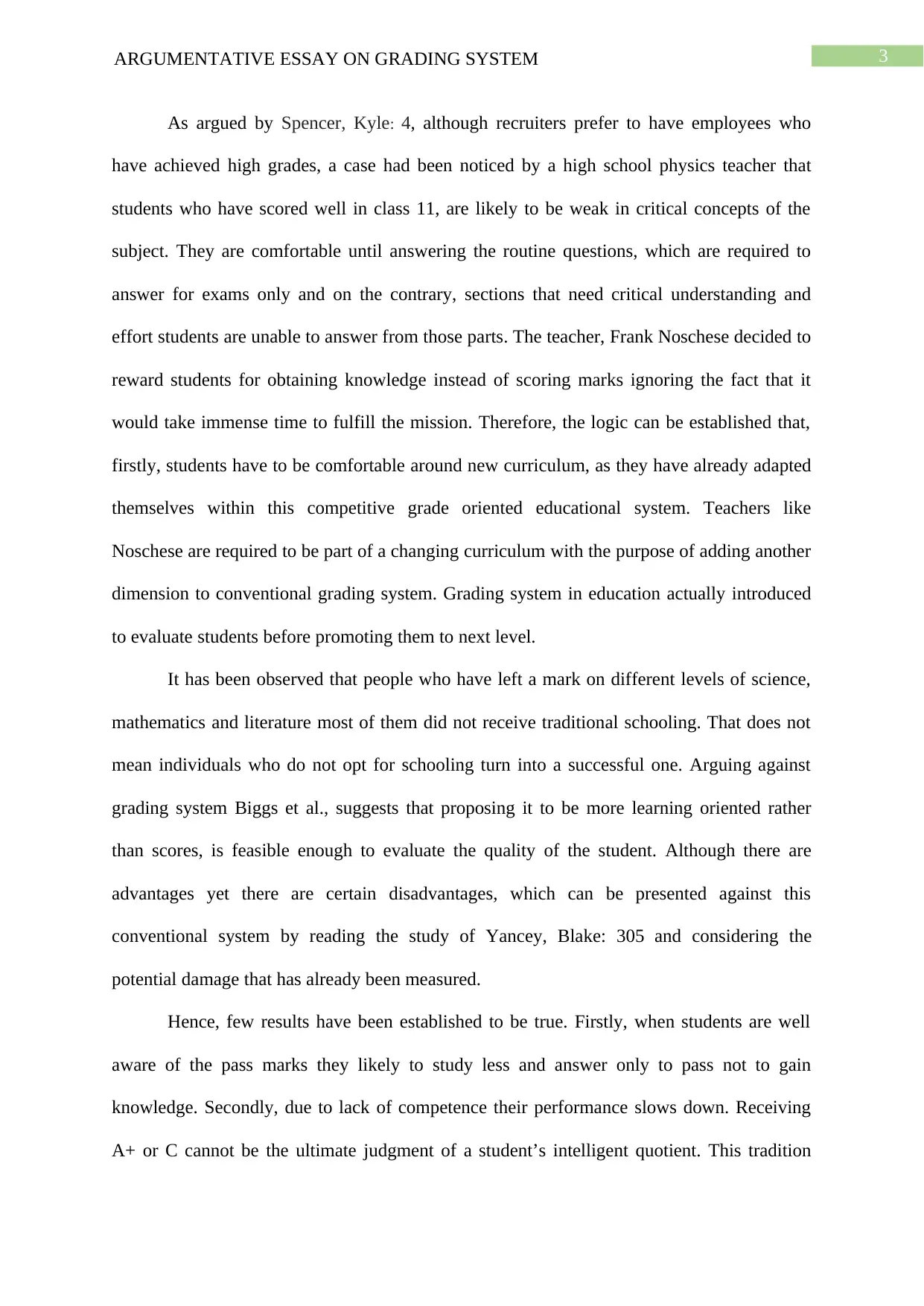
3ARGUMENTATIVE ESSAY ON GRADING SYSTEM
As argued by Spencer, Kyle: 4, although recruiters prefer to have employees who
have achieved high grades, a case had been noticed by a high school physics teacher that
students who have scored well in class 11, are likely to be weak in critical concepts of the
subject. They are comfortable until answering the routine questions, which are required to
answer for exams only and on the contrary, sections that need critical understanding and
effort students are unable to answer from those parts. The teacher, Frank Noschese decided to
reward students for obtaining knowledge instead of scoring marks ignoring the fact that it
would take immense time to fulfill the mission. Therefore, the logic can be established that,
firstly, students have to be comfortable around new curriculum, as they have already adapted
themselves within this competitive grade oriented educational system. Teachers like
Noschese are required to be part of a changing curriculum with the purpose of adding another
dimension to conventional grading system. Grading system in education actually introduced
to evaluate students before promoting them to next level.
It has been observed that people who have left a mark on different levels of science,
mathematics and literature most of them did not receive traditional schooling. That does not
mean individuals who do not opt for schooling turn into a successful one. Arguing against
grading system Biggs et al., suggests that proposing it to be more learning oriented rather
than scores, is feasible enough to evaluate the quality of the student. Although there are
advantages yet there are certain disadvantages, which can be presented against this
conventional system by reading the study of Yancey, Blake: 305 and considering the
potential damage that has already been measured.
Hence, few results have been established to be true. Firstly, when students are well
aware of the pass marks they likely to study less and answer only to pass not to gain
knowledge. Secondly, due to lack of competence their performance slows down. Receiving
A+ or C cannot be the ultimate judgment of a student’s intelligent quotient. This tradition
As argued by Spencer, Kyle: 4, although recruiters prefer to have employees who
have achieved high grades, a case had been noticed by a high school physics teacher that
students who have scored well in class 11, are likely to be weak in critical concepts of the
subject. They are comfortable until answering the routine questions, which are required to
answer for exams only and on the contrary, sections that need critical understanding and
effort students are unable to answer from those parts. The teacher, Frank Noschese decided to
reward students for obtaining knowledge instead of scoring marks ignoring the fact that it
would take immense time to fulfill the mission. Therefore, the logic can be established that,
firstly, students have to be comfortable around new curriculum, as they have already adapted
themselves within this competitive grade oriented educational system. Teachers like
Noschese are required to be part of a changing curriculum with the purpose of adding another
dimension to conventional grading system. Grading system in education actually introduced
to evaluate students before promoting them to next level.
It has been observed that people who have left a mark on different levels of science,
mathematics and literature most of them did not receive traditional schooling. That does not
mean individuals who do not opt for schooling turn into a successful one. Arguing against
grading system Biggs et al., suggests that proposing it to be more learning oriented rather
than scores, is feasible enough to evaluate the quality of the student. Although there are
advantages yet there are certain disadvantages, which can be presented against this
conventional system by reading the study of Yancey, Blake: 305 and considering the
potential damage that has already been measured.
Hence, few results have been established to be true. Firstly, when students are well
aware of the pass marks they likely to study less and answer only to pass not to gain
knowledge. Secondly, due to lack of competence their performance slows down. Receiving
A+ or C cannot be the ultimate judgment of a student’s intelligent quotient. This tradition
Paraphrase This Document
Need a fresh take? Get an instant paraphrase of this document with our AI Paraphraser
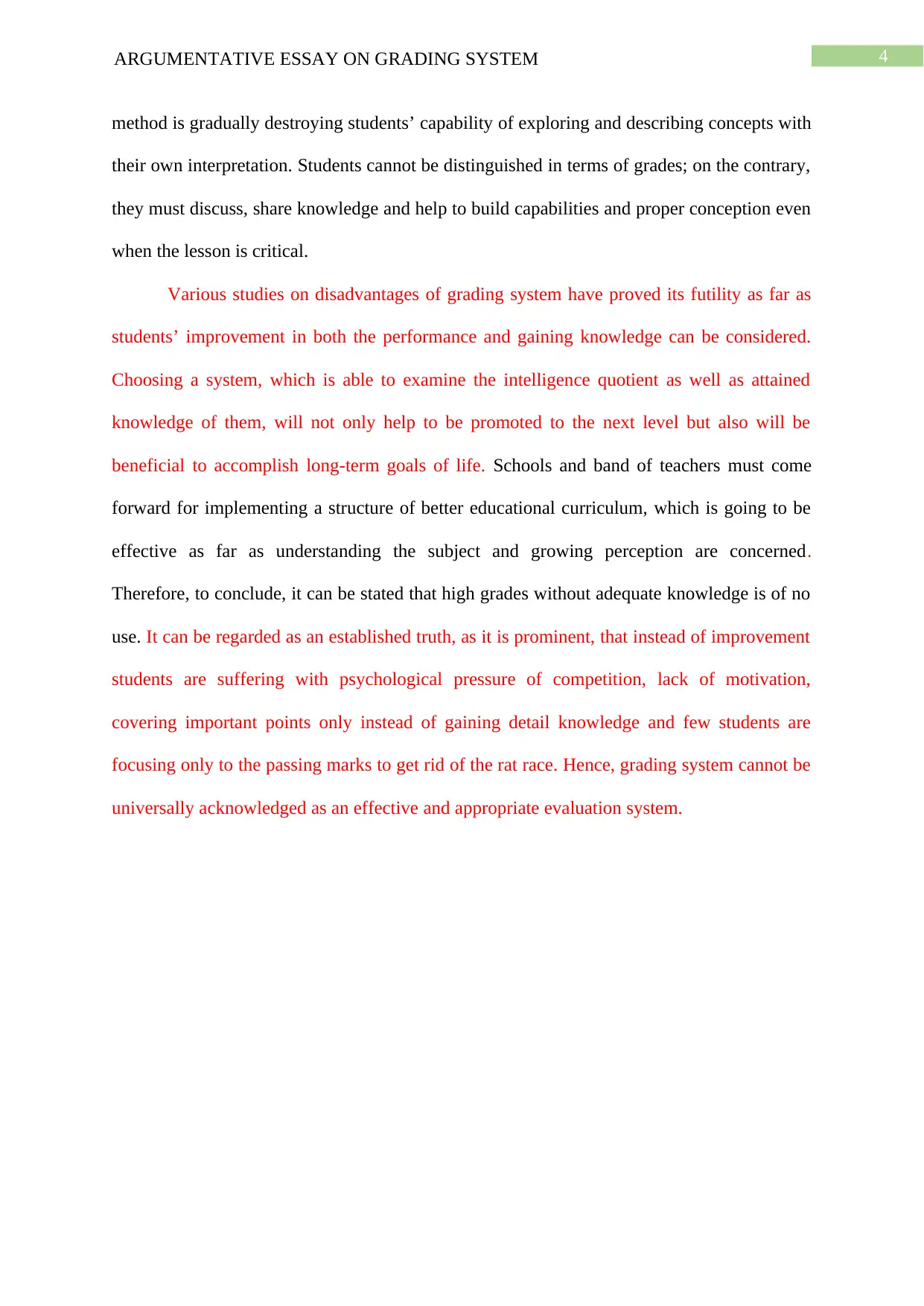
4ARGUMENTATIVE ESSAY ON GRADING SYSTEM
method is gradually destroying students’ capability of exploring and describing concepts with
their own interpretation. Students cannot be distinguished in terms of grades; on the contrary,
they must discuss, share knowledge and help to build capabilities and proper conception even
when the lesson is critical.
Various studies on disadvantages of grading system have proved its futility as far as
students’ improvement in both the performance and gaining knowledge can be considered.
Choosing a system, which is able to examine the intelligence quotient as well as attained
knowledge of them, will not only help to be promoted to the next level but also will be
beneficial to accomplish long-term goals of life. Schools and band of teachers must come
forward for implementing a structure of better educational curriculum, which is going to be
effective as far as understanding the subject and growing perception are concerned.
Therefore, to conclude, it can be stated that high grades without adequate knowledge is of no
use. It can be regarded as an established truth, as it is prominent, that instead of improvement
students are suffering with psychological pressure of competition, lack of motivation,
covering important points only instead of gaining detail knowledge and few students are
focusing only to the passing marks to get rid of the rat race. Hence, grading system cannot be
universally acknowledged as an effective and appropriate evaluation system.
method is gradually destroying students’ capability of exploring and describing concepts with
their own interpretation. Students cannot be distinguished in terms of grades; on the contrary,
they must discuss, share knowledge and help to build capabilities and proper conception even
when the lesson is critical.
Various studies on disadvantages of grading system have proved its futility as far as
students’ improvement in both the performance and gaining knowledge can be considered.
Choosing a system, which is able to examine the intelligence quotient as well as attained
knowledge of them, will not only help to be promoted to the next level but also will be
beneficial to accomplish long-term goals of life. Schools and band of teachers must come
forward for implementing a structure of better educational curriculum, which is going to be
effective as far as understanding the subject and growing perception are concerned.
Therefore, to conclude, it can be stated that high grades without adequate knowledge is of no
use. It can be regarded as an established truth, as it is prominent, that instead of improvement
students are suffering with psychological pressure of competition, lack of motivation,
covering important points only instead of gaining detail knowledge and few students are
focusing only to the passing marks to get rid of the rat race. Hence, grading system cannot be
universally acknowledged as an effective and appropriate evaluation system.
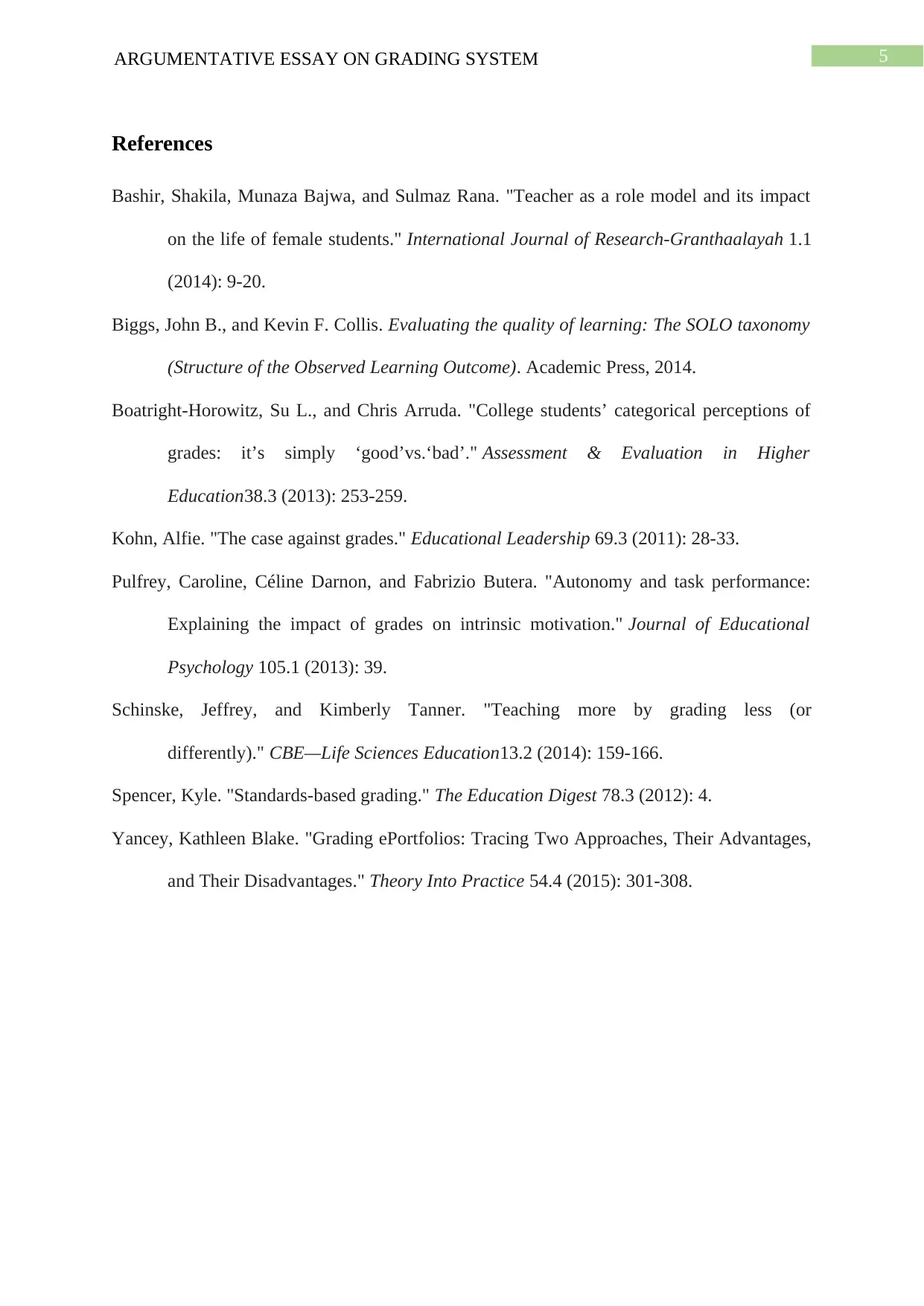
5ARGUMENTATIVE ESSAY ON GRADING SYSTEM
References
Bashir, Shakila, Munaza Bajwa, and Sulmaz Rana. "Teacher as a role model and its impact
on the life of female students." International Journal of Research-Granthaalayah 1.1
(2014): 9-20.
Biggs, John B., and Kevin F. Collis. Evaluating the quality of learning: The SOLO taxonomy
(Structure of the Observed Learning Outcome). Academic Press, 2014.
Boatright-Horowitz, Su L., and Chris Arruda. "College students’ categorical perceptions of
grades: it’s simply ‘good’vs.‘bad’." Assessment & Evaluation in Higher
Education38.3 (2013): 253-259.
Kohn, Alfie. "The case against grades." Educational Leadership 69.3 (2011): 28-33.
Pulfrey, Caroline, Céline Darnon, and Fabrizio Butera. "Autonomy and task performance:
Explaining the impact of grades on intrinsic motivation." Journal of Educational
Psychology 105.1 (2013): 39.
Schinske, Jeffrey, and Kimberly Tanner. "Teaching more by grading less (or
differently)." CBE—Life Sciences Education13.2 (2014): 159-166.
Spencer, Kyle. "Standards-based grading." The Education Digest 78.3 (2012): 4.
Yancey, Kathleen Blake. "Grading ePortfolios: Tracing Two Approaches, Their Advantages,
and Their Disadvantages." Theory Into Practice 54.4 (2015): 301-308.
References
Bashir, Shakila, Munaza Bajwa, and Sulmaz Rana. "Teacher as a role model and its impact
on the life of female students." International Journal of Research-Granthaalayah 1.1
(2014): 9-20.
Biggs, John B., and Kevin F. Collis. Evaluating the quality of learning: The SOLO taxonomy
(Structure of the Observed Learning Outcome). Academic Press, 2014.
Boatright-Horowitz, Su L., and Chris Arruda. "College students’ categorical perceptions of
grades: it’s simply ‘good’vs.‘bad’." Assessment & Evaluation in Higher
Education38.3 (2013): 253-259.
Kohn, Alfie. "The case against grades." Educational Leadership 69.3 (2011): 28-33.
Pulfrey, Caroline, Céline Darnon, and Fabrizio Butera. "Autonomy and task performance:
Explaining the impact of grades on intrinsic motivation." Journal of Educational
Psychology 105.1 (2013): 39.
Schinske, Jeffrey, and Kimberly Tanner. "Teaching more by grading less (or
differently)." CBE—Life Sciences Education13.2 (2014): 159-166.
Spencer, Kyle. "Standards-based grading." The Education Digest 78.3 (2012): 4.
Yancey, Kathleen Blake. "Grading ePortfolios: Tracing Two Approaches, Their Advantages,
and Their Disadvantages." Theory Into Practice 54.4 (2015): 301-308.
⊘ This is a preview!⊘
Do you want full access?
Subscribe today to unlock all pages.

Trusted by 1+ million students worldwide
1 out of 6
Related Documents
Your All-in-One AI-Powered Toolkit for Academic Success.
+13062052269
info@desklib.com
Available 24*7 on WhatsApp / Email
![[object Object]](/_next/static/media/star-bottom.7253800d.svg)
Unlock your academic potential
Copyright © 2020–2026 A2Z Services. All Rights Reserved. Developed and managed by ZUCOL.



